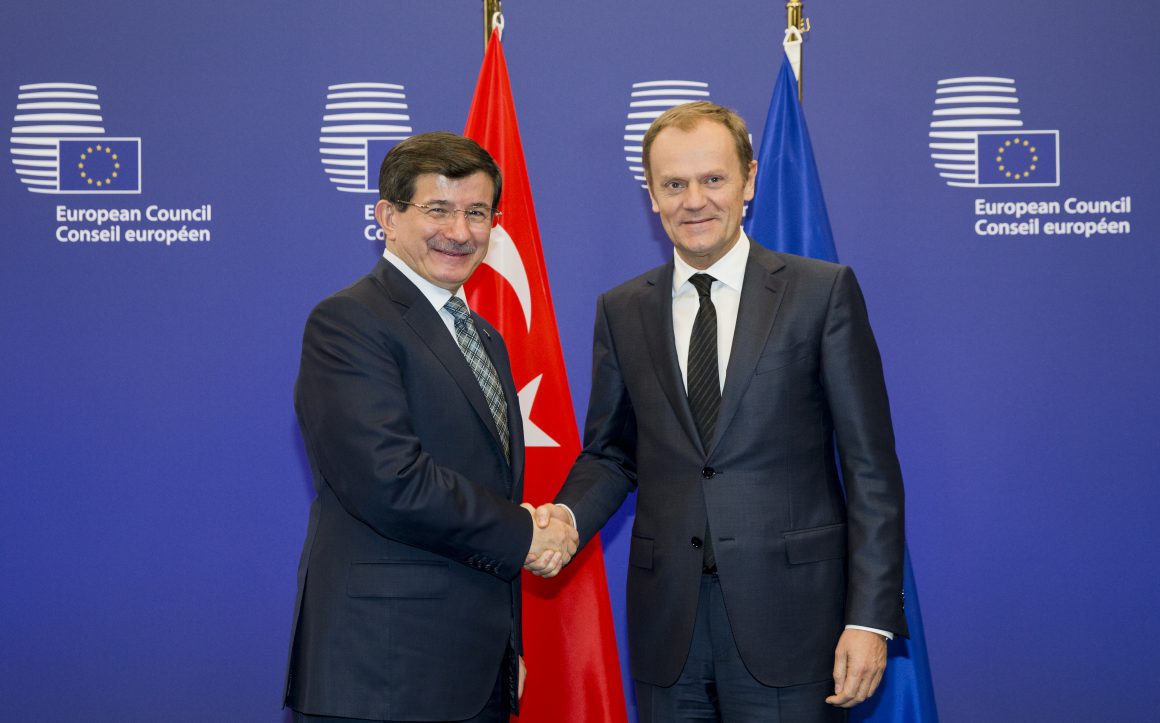On 7 March 2016, a meeting of the EU leaders and Turkey took place in Brussels with migration and the refugee crisis at the heart of the agenda. A plan in the making is the end result of this round of negotiations with Turkey, a plan which has been characterized – perhaps prematurely – as a “breakthrough” (German Chancellor Angela Merkel), as a “game-changing decision” (Turkish Prime Minister Ahmet Davutoglu) and as a response that will “break the business of smugglers” (European Commission President Jean-Claude Juncker).
The current situation finds more than a million people – only in 2015 – have illegally entered the EU’s territory, mainly in Italy and Greece via Turkey, about half of them Syrians. Another 2.7 million Syrian refugees have found shelter in Turkey over the past couple of years. Xenophobia in Europe is on the rise due to the large influx of refugees alongside the terrorist attacks in Paris last November. The Schengen Area is wobbling; six countries – Belgium, Denmark, France, Germany, Sweden and non-EU Norway – have introduced emergency border checks.
The EU’s response so far has consisted of relocation plans, like the one of May 2015, which initially proposed to relocate 40,000 people from Italy and Greece to other EU member states within the next 2 years. The number was adjusted upwards last September, reaching 120,000 people while including Hungary in the equation as well. Of course, this would be only a fraction of the one million people looking for asylum in Europe. But even that was not implemented: six months later, only 660 migrants have been relocated under the EU scheme.
Moreover, the EU’s assistance for humanitarian aid and civil protection, which initially stood at €4.6bn, had substantially increased to €10bn by the end of 2015. Mr. Davutoglu claimed on 7 March in Brussels that Turkey has already allocated $10bn from the country’s national budget exclusively for the refugees residing in camps on its territory. The previous EU-Turkey Summit on 29 November, 2015 had resulted in Turkey being promised €3 billion as part of the Joint Action Plan, providing assistance to Syrians under temporary protection in Turkey. So far, €95 million have been unlocked so as to provide Syrian children access to education and food assistance.
In this light, let’s see what is in the latest plan that might turn the tide in Europe’s favour this time…
The main components of the negotiations that took place on 7 March include, inter alia, a re-admission agreement between Greece and Turkey, according to which the latter will accept the return of all migrants who enter Greece illegally, regardless of their ethnicity. Those who are not considered in need of international protection (e.g. Afghans) will be sent back to their country of origin. Emergency support will also be provided to Greece by the European Commission in the form of €700m in humanitarian aid and by pushing harder to implement the relocation plan to alleviate part of Greece’s burden.
The potential agreement comes at a price, at least from Turkey’s perspective. The bill includes additional funds – supplementary to the initial €3bn – which, according to the Turkish Prime Minister, is fair burden-sharing for a problem that is neither Turkey’s nor Europe’s alone. For each Syrian re-admitted to Turkey from Greece, one Syrian will be resettled in Europe – through legal channels and applications submitted from outside Europe. Moreover, Mr. Davutoglu requested further concessions, including visa-free travel to the EU for Turkish citizens – to be established in accord with Turkish authorities by the end of June 2016 – and the opening of five new chapters in Turkey’s EU membership accession negotiations.
The President of the European Commission, Jean-Claude Juncker, reassured that the proposed action plan is legal, and in line with Article 33 of the Asylum Procedure Directive. Moreover, he is confident that the border controls within the EU will be lifted and that the Schengen Area will return to normalcy by the end of 2016.
Nevertheless, the fact that Turkey is not a full member of the Geneva Convention on the Status of Refugees and that several EU members are opposed to the Commission’s relocation plan – Hungary vetoed the Turkish resettlement proposal – are only some of the thorny issues that need to be addressed at the next EU Summit on 17-18 March. Till then, how the refugee crisis saga ends remains “to be continued”.


